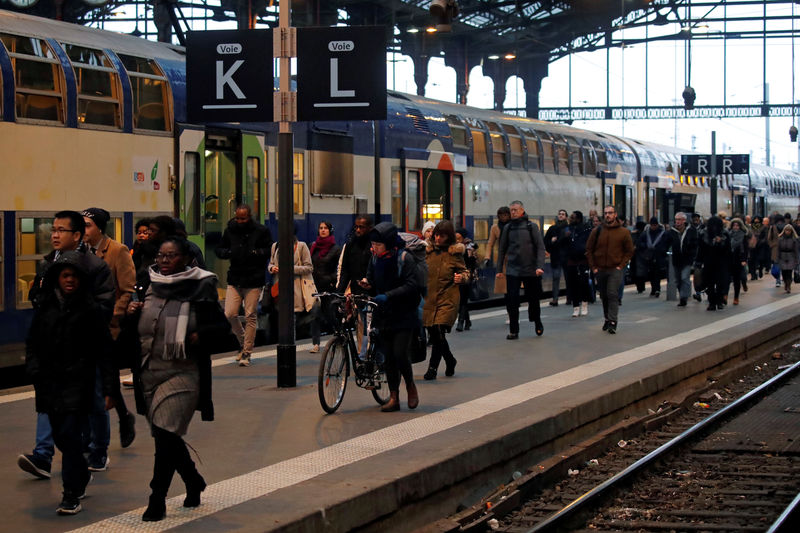By Bate Felix and Tangi Salaün
PARIS (Reuters) - France faced a second day of travel chaos and understaffed schools and hospitals on Friday as unions said there would be no let-up in a strike against Emmanuel Macron's pension reforms until the president backed down.
Much of France ground to a halt on Thursday as transport workers went on strike - joined by teachers, doctors, police, firemen and civil servants. Smoke and tear gas swirled through the streets of Paris and Nantes as protests turned violent.
The strike pits Macron, a 41-year-old former investment banker who took office in 2017 on a promise of opening up France's highly regulated economy, against powerful unions who say he is set on dismantling worker protections.
There were cancellations of rush-hour trains into Paris on Friday and 10 out of 16 metro lines were closed while others ran limited services. As commuters took to their cars, traffic jams totaling 350 km clogged the roads in and around the capital, according to traffic app Styadin.
Rail workers extended their strike through Friday, while unions at the Paris bus and metro operator RATP said their walkout would continue until Monday.
"We're going to protest for a week at least, and at the end of that week it's the government that's going to back down," said 50-year-old Paris transport employee Patrick Dos Santos.
The main trade unions were to meet on Friday morning to decide the next course of action.
The outcome depends on who blinks first - the unions who risk losing public support if the disruption goes on for too long, or the president whose two-and-a-half years in office have been rocked by waves of social unrest.
"NOISE IN THE STREETS"
Education Minister Jean-Michel Blanquer said deep reform was needed to put the generous pension system on a sustainable footing. Fewer teachers were expected to strike on Friday, he said.
"It would be much easier for us to do nothing, like others before us," Blanquer told BFM TV. "We could see through this five-year term without enacting deep reform. But if every presidency reasons in this way, our children will not have an acceptable pension system."
The industrial action on Thursday brought tens of thousands of protesters into the streets in Paris and forced the closure of the Eiffel Tower and parts of the Louvre Museum.
Union leaders were buoyed by the number of healthcare staff, railway workers and teachers who heeded the strike call, and by the numbers who showed up at an anti-government march in Paris and other French cities.
"There's a noise in the streets, I hope the windows of the Elysee are open," said Philippe Martinez, secretary-general of the CGT union, referring to the president's office.
Macron wants to simplify the unwieldy pension system, which comprises more than 40 different plans. Rail workers and mariners can for instance retire up to a decade earlier than the average worker.
Macron says the system is unfair and too costly and that the French will have to work longer, though he appears reluctant to simply raise the retirement age of 62.
The French will have to work longer, the president insists, but appears reluctant to simply raise the retirement age of 62. One alternative is to curb benefits for those who stop working before 64 and give a benefits boost to those who leave later.
